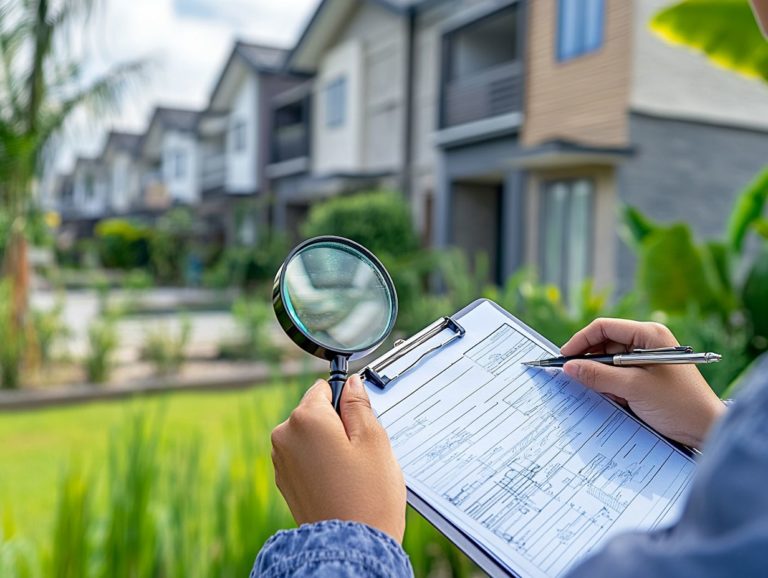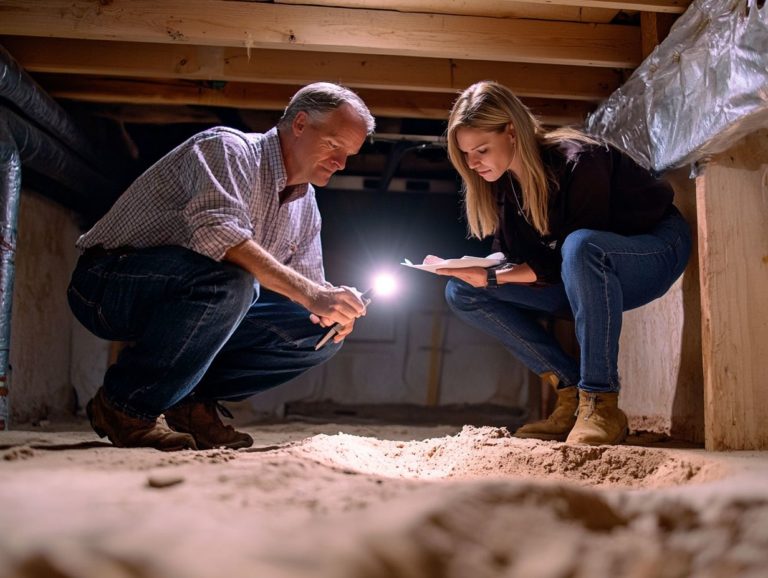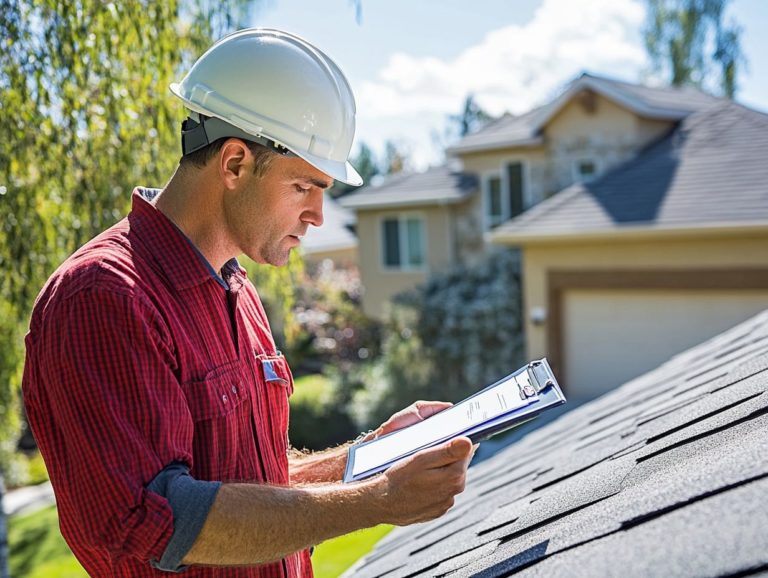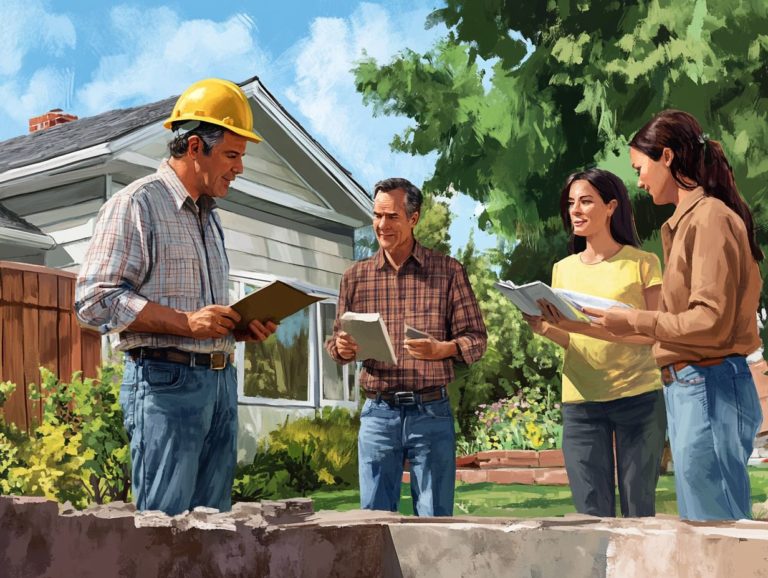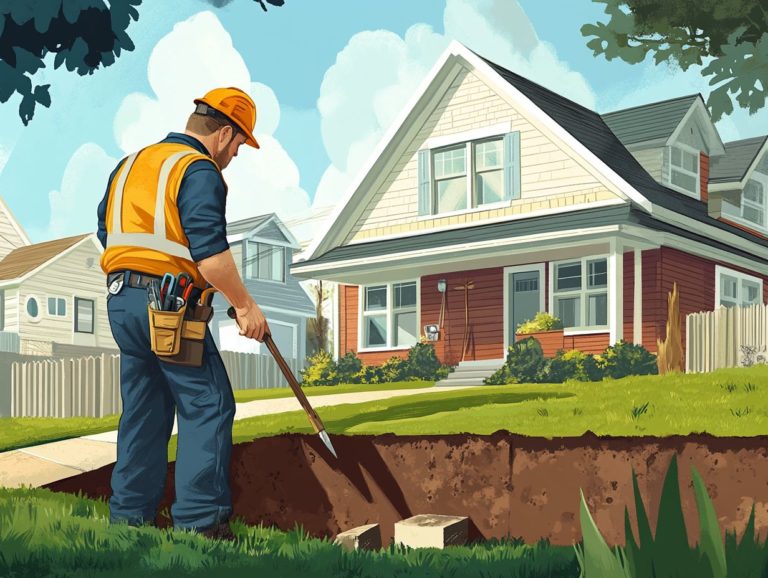How to Prepare Your Home for an Inspection
When you re entering the world of buying or selling a home, a home inspection can be a total game-changer! Understanding its purpose is vital, as it helps you uncover potential issues before they escalate into major headaches.
This guide delves into how you can prepare for a home inspection. It highlights essential checklists for both the interior and exterior of your property. It covers common problems that inspectors frequently encounter and offers tips to enhance your home s appeal.
Whether you’re a seller looking to impress potential buyers or a buyer hoping for peace of mind, this information provides crucial insights for ensuring a successful home inspection.
Contents
- Key Takeaways:
- Why Home Inspections are Important
- Preparing for a Home Inspection
- Interior Inspection Checklist
- Exterior Inspection Checklist
- Common Issues Found During Inspections
- Tips for a Successful Home Inspection
- Frequently Asked Questions
- What is an inspection for a home?
- Why is it important to prepare your home for an inspection?
- How should I prepare my home for an inspection?
- What are some common areas that are inspected during a home inspection?
- Can I be present during the inspection?
- What should I do if issues are found during the inspection?
Key Takeaways:
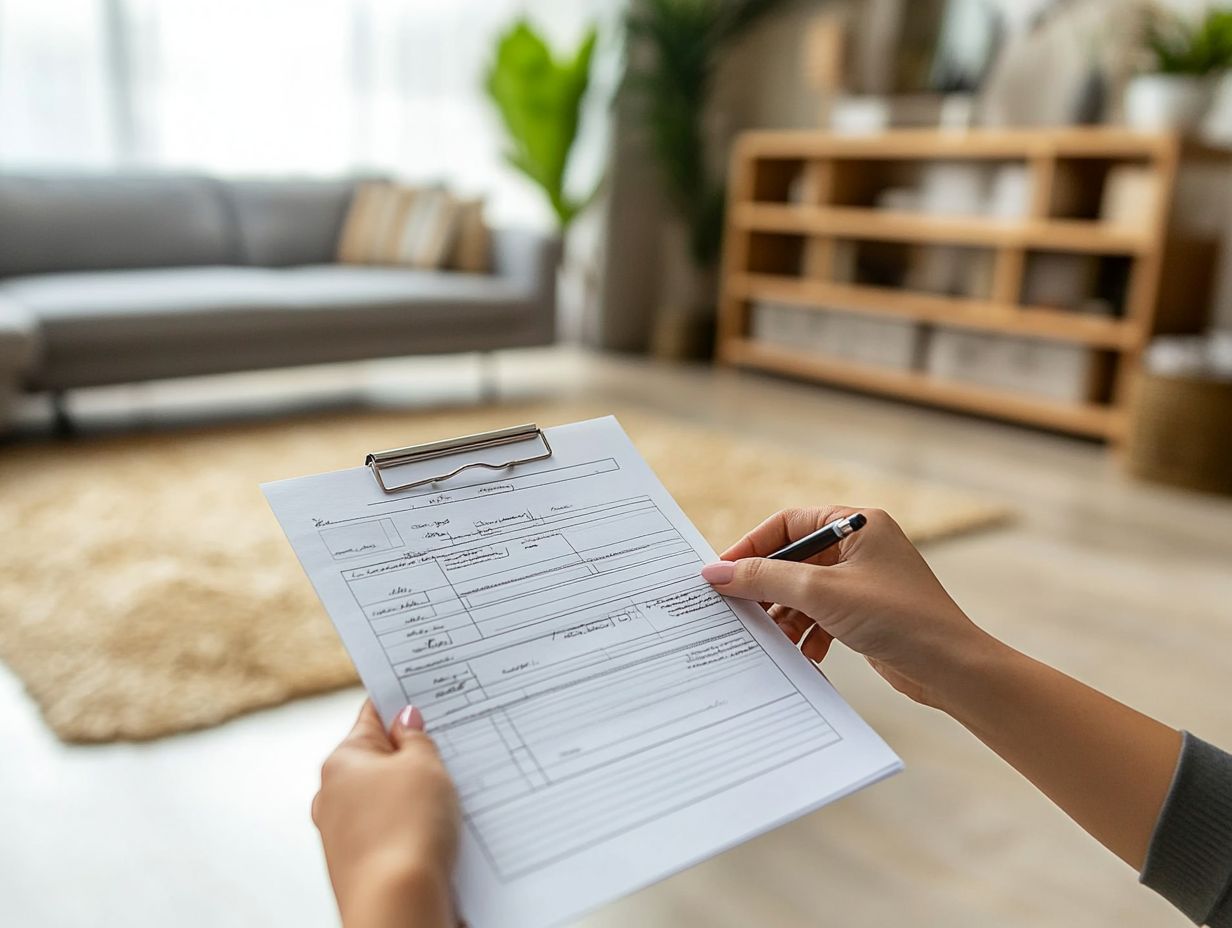
Home inspections are crucial for identifying potential problems and ensuring the safety and value of your home. To prepare for your home inspection, declutter, make repairs, and address any known issues beforehand. Key areas to focus on during an inspection include the roof, electrical system, and plumbing, while common issues may include mold, leaks, and outdated appliances.
Why Home Inspections are Important
Home inspections are an important part of buying or selling a home. They provide you, whether a seller or a potential buyer, with invaluable insights into the property’s condition.
By identifying repair issues early on, a home inspection gives you the power to negotiate effectively. This helps you secure a better price and sidestep future disputes.
For buyers, it reassures you about the home’s value and safety features. This proactive approach makes the sale smoother and gives everyone peace of mind.
Understanding the Purpose of Home Inspections
The primary purpose of home inspections is to provide a thorough evaluation of a property s safety features and overall condition. This ensures that you, whether a buyer or seller, are well-informed.
A comprehensive inspection covers various crucial areas, including structural integrity, electrical systems, plumbing, and HVAC units. Each of these elements is essential to the property s functionality and safety.
For instance, examining the electrical systems can reveal outdated wiring that may pose hazards. Assessing plumbing might uncover leaks or other issues that could lead to costly repairs.
The findings from these inspections can significantly shape your concerns, influencing your decisions and negotiations. A detailed inspection report not only highlights existing problems but also offers a clear understanding of future maintenance needs, giving you the power to make informed choices.
Preparing for a Home Inspection
Preparing for a home inspection entails several vital steps that can profoundly affect the inspection process and the subsequent report. Knowing how to prepare your home for an inspection ultimately influences the sale of your home.
Ensuring easy accessibility, maintaining a pristine environment, and providing comprehensive maintenance records are essential components for a smooth and effective inspection day.
By prioritizing these preparations, you can enhance your home’s appeal and cultivate an atmosphere of confidence for potential buyers, ensuring you’re ready with tips for a successful home inspection day.
Steps to Take Before the Inspection
Before a home inspection, it’s essential for you as a seller to take a few key steps to prepare for a home inspection to ensure your property shines in the best light possible. This positively influences potential buyers’ perceptions.
Start by tackling any repair issues think leaky faucets, patched holes in walls, and ensuring all appliances are in good working order.
Consider decluttering your spaces; a tidy room not only appears larger but also feels more inviting.
Employ effective cleaning strategies, like deep-cleaning carpets and windows, to create a fresh atmosphere that will surely attract buyers.
Having an inspection checklist on hand is vital; this shows you are prepared and transparent.
By fixing visible issues, you can really boost buyer trust and make your home stand out in today’s market!
Interior Inspection Checklist
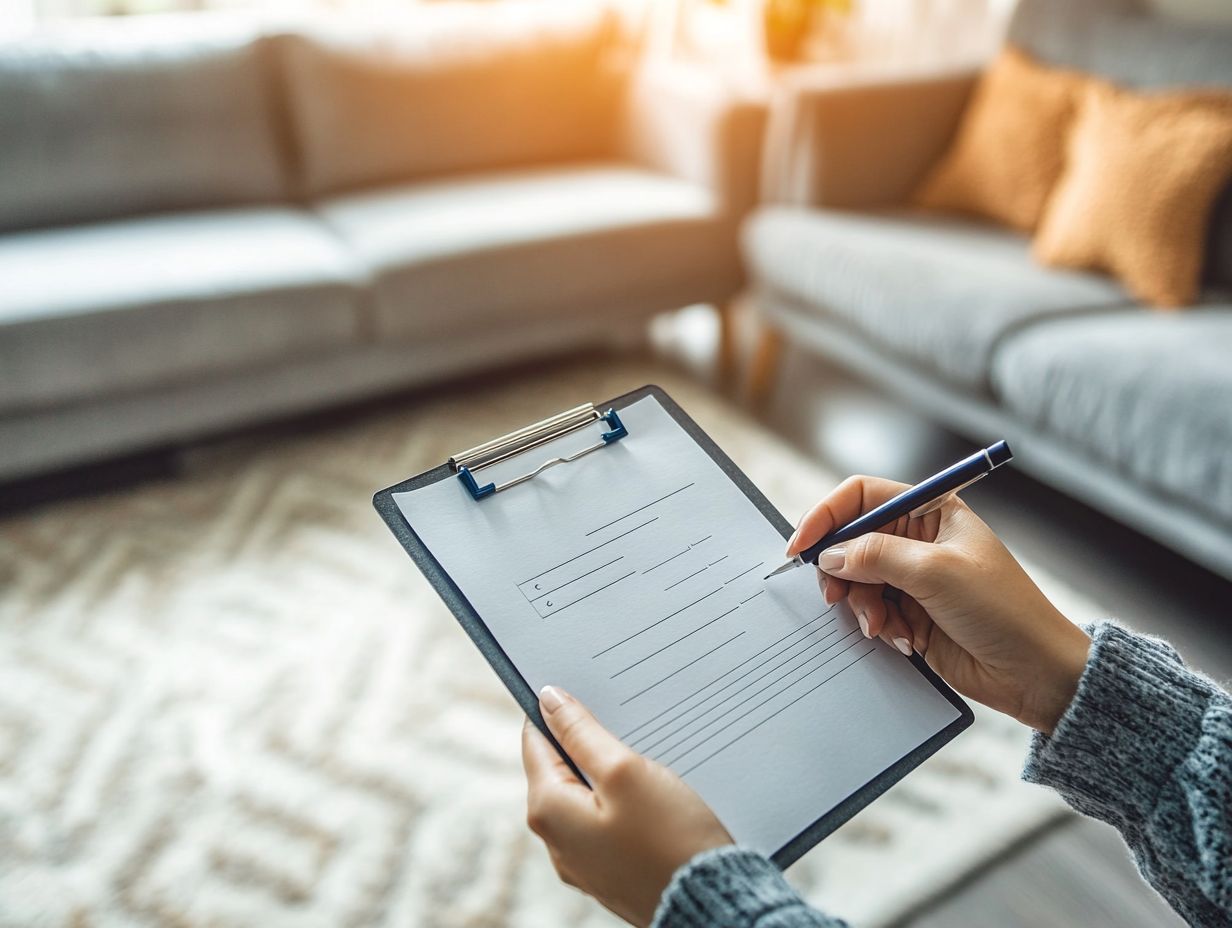
An effective interior inspection checklist is essential for you to evaluate crucial home features, including the electrical panel, plumbing system, and HVAC system.
This meticulous approach ensures that all safety elements are functioning as they should, giving you peace of mind in your living environment.
Ready to get started? Let’s make your home shine for that inspection!
Key Areas to Focus On
When you’re preparing for an interior inspection, focus on key areas to evaluate the home’s condition, following key steps for a home inspection.
The attic needs your attention. Look for signs of moisture or pests, as issues here can lead to serious structural damage.
Don t overlook the crawl space. It can be a hidden source of mold and poor ventilation, affecting air quality and health.
Pay close attention to the electrical systems. Identifying outdated wiring or fire hazards can prevent major headaches later.
Make sure the plumbing is free from leaks or corrosion. This will help you avoid costly repairs down the road.
Each of these areas is vital for your safety and how potential buyers view the home’s value and livability.
Exterior Inspection Checklist
A thorough exterior inspection checklist helps evaluate your property s condition and boost curb appeal.
This can make your property more attractive to buyers, ensuring a lasting impression.
Important Exterior Features to Check
Focus on key features that impact your property’s appeal and structure.
The foundation is the backbone of any home. Cracks or shifts may indicate serious structural problems.
The roof protects the interior and adds to the home s charm. Well-maintained gutters are essential for proper water drainage.
Neglecting these components can lead to expensive repairs, which might deter buyers looking for low-maintenance properties.
Regular maintenance checks on these features are essential for preserving the home’s value and appeal.
Common Issues Found During Inspections
Home inspections often reveal issues that can impact a property’s marketability.
Common concerns include problems with the electrical system, plumbing, and foundation.
Identifying and Addressing Common Problems
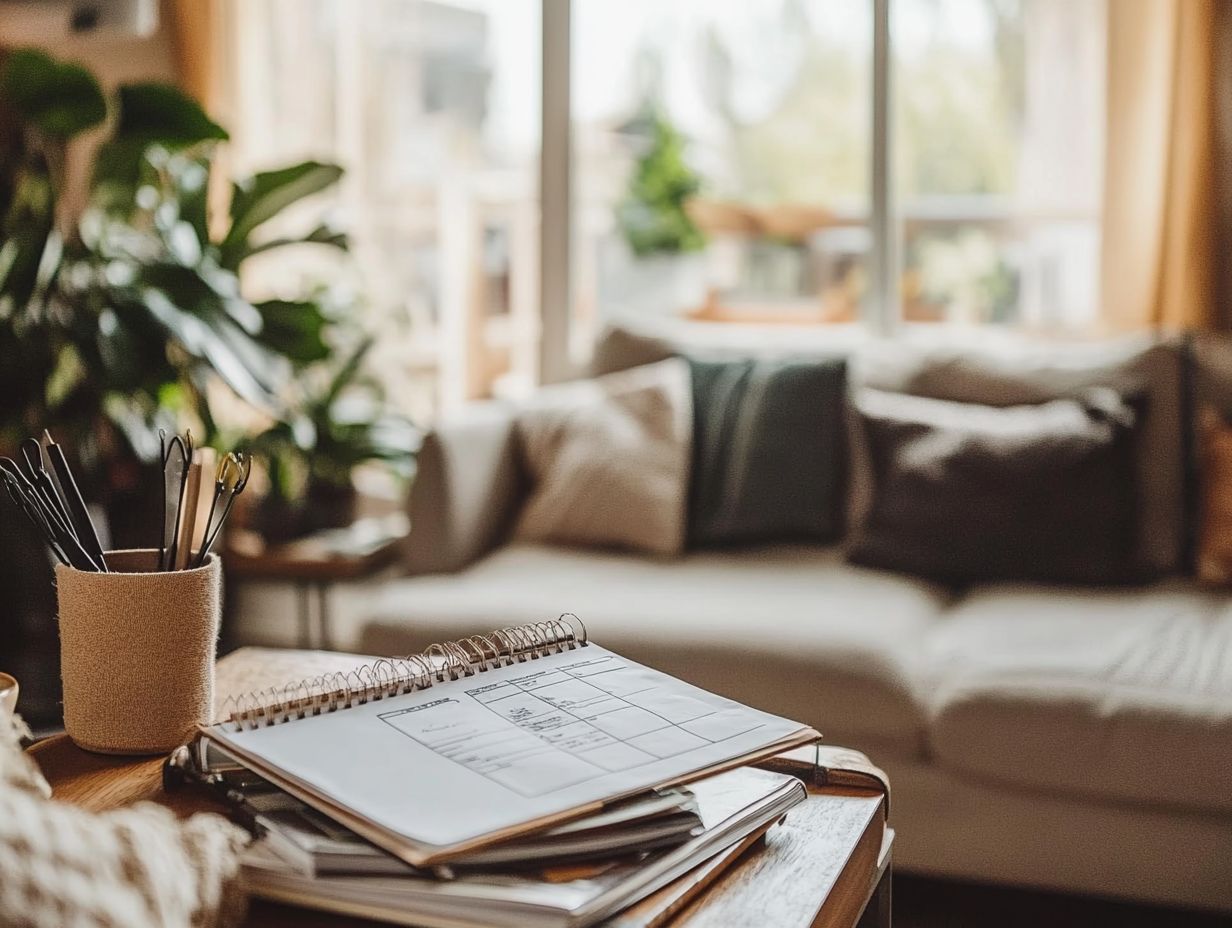
Addressing common issues during a home inspection can enhance your property s value and facilitate smoother negotiations.
Evaluate frequent problems like plumbing leaks and electrical hazards to tackle them before they worsen.
Providing detailed repair estimates establishes transparency and shows your commitment to the property’s condition.
This proactive approach builds trust with buyers, leading to a more favorable inspection outcome.
When buyers see that major issues have been resolved, their confidence in the purchase increases, making negotiations easier.
Tips for a Successful Home Inspection
To ensure a successful home inspection, follow key tips outlined in our guide on how to prepare for a successful home inspection that will enhance your property’s impression and address buyers’ concerns.
Maximizing Your Home’s Appeal and Value
Maximizing your home’s appeal and value can impact your home inspection success. Sellers should prioritize thoughtful improvements and follow guidelines on how to prepare for a home inspection.
By focusing on small yet significant changes, you can create an inviting atmosphere that captivates potential buyers. Tackling minor repairs like fixing leaky faucets or freshening up scuffed walls can transform the overall impression of your home.
Elevating your home’s exterior with landscaping, a fresh coat of paint, or updated fixtures ensures you create a positive first look. These enhancements show your property’s true potential and streamline the negotiation process.
A well-maintained home fosters buyer trust, making them more inclined to embrace the value you present.
Watch this video for helpful tips!
Frequently Asked Questions
What is an inspection for a home?
An inspection for a home is a thorough examination of the property’s condition and systems, typically performed by a professional inspector. This is often done before buying or selling a home and can also be required for insurance or mortgage purposes.
Why is it important to prepare your home for an inspection?

Preparing well can lead to a stress-free inspection experience! Following the right steps can also help identify potential issues that may need to be addressed before the inspection, so check out this guide on how to prepare for a home inspection, saving you time and money in the long run.
How should I prepare my home for an inspection?
Start by decluttering and cleaning your home, both inside and outside. Make sure all utilities are turned on and accessible. It’s also a good idea to have all relevant documents organized and readily available, especially if you’re looking for tips on how to prepare for a home inspection as a buyer.
What are some common areas that are inspected during a home inspection?
A home inspection typically covers the major systems and components of a home, such as the roof, foundation, plumbing, electrical, HVAC, and appliances. The inspector may also check for any safety hazards or code violations.
Can I be present during the inspection?
Yes, it’s recommended that you attend the inspection. This will give you the opportunity to ask questions and learn more about your home. However, it’s important to give the inspector space to do their job and refrain from interfering with the process.
What should I do if issues are found during the inspection?
If the inspector identifies any issues or concerns, don’t panic. Take the time to carefully review the report and discuss any findings with your real estate agent. You may also want to consider getting a second opinion from a specialist or contractor. Negotiate repairs or credits with the seller if needed.


